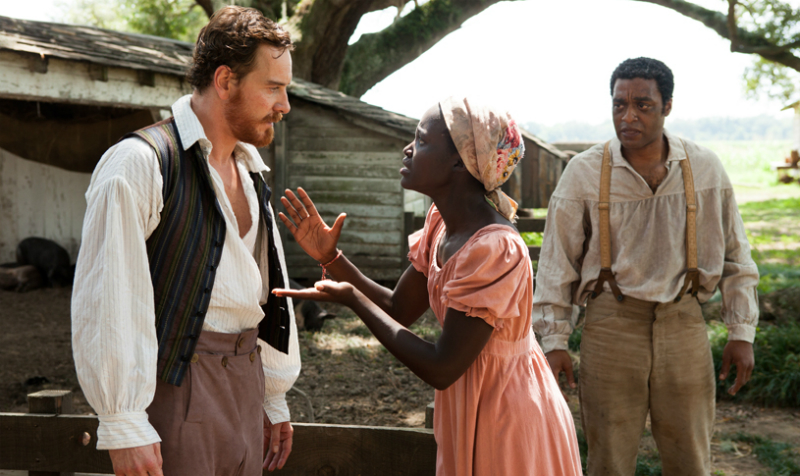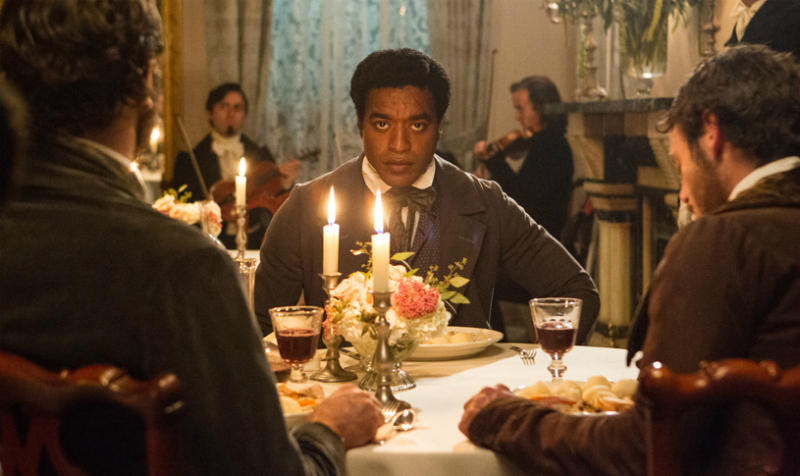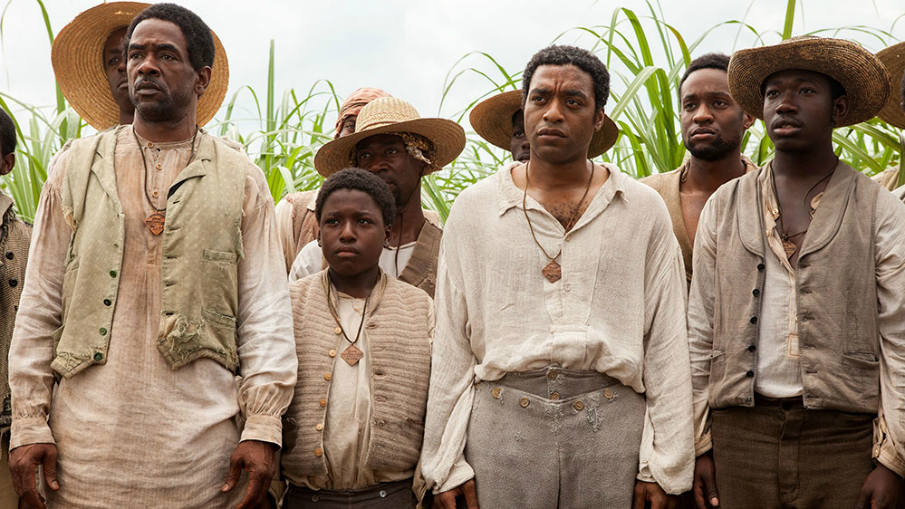The Academy awarding Best Picture of 2013 to 12 Years a Slave felt like a refreshing change of pace after the past three years. Voters had picked strong yet ultimately forgettable films as Best Picture in years prior, but 12 Years a Slave is the kind of film that wouldn’t and still cannot be forgotten. While it was not even my personal choice for best film of the year, I cannot argue with what its victory means, especially with director/producer Steve McQueen becoming the first black producer to win Best Picture in Academy history.
2013 was a great year at the Oscars in general, beyond 12 Years a Slave. There were a number of fun films in contention, from the thrills of Gravity to the chaotic American Hustle, moving dramas like Dallas Buyers Club, Nebraska and Philomena, and one of the most thought-provoking films in recent memory, Her. Even beyond the Best Picture lineup there was Frozen-mania, Pharrell Williams’ song “Happy” from Despicable Me 2, and great documentaries like The Act of Killing, The Square, and 20 Feet from Stardom. Ellen DeGeneres was the host, and it was the highest-rated telecast in 10 years.
It was one of the rare years where I could not quibble with any of the films nominated for Best Picture. There was simply an intangible energy in the air, and despite only three films receiving more than one Oscar (12 Years a Slave, Gravity, and Dallas Buyers Club), it still felt like a big celebration of a great year in film.
So how did 12 Years a Slave pull it off? Let’s look back on 2013 and track the race.
The Socio-Political Climate
Women at the box office totally ruled in 2013, with The Hunger Games: Catching Fire being the first female-led movie to top the year-end box office since 1997’s Titanic. Seven other films with female leads made it into the Top 20, including Frozen (no. 3), Gravity (no. 6), The Heat (no. 15), We’re the Millers (no. 16), American Hustle (no. 17), The Conjuring (no. 19), and Identity Thief (no. 20). This was also the same year Orange Is the New Black debuted on Netflix and showed how women of diverse backgrounds could provide hours of engaging storytelling. With so many decades dominated by men, Hollywood was sensing, “Hey, maybe there’s another gender we can appeal to?”
Meanwhile, the Academy was at an interesting point in its legacy. Four years previous they had expanded the Best Picture lineup to 10, which they kept for another year only to change it to a sliding scale of 5-10 nominees in 2011. I would argue that three of these four years had rewarded the most “agreeable” nominee of the bunch rather than the true “best” picture. It’s difficult for me to realistically say that The King’s Speech, The Artist, and Argo were really the best films of their respective years. All of them benefited from the preferential ballot system, where Academy voters rank the films from best to worst, and if no films reach a certain percentage of no. 1 votes, it goes to the no. 2 votes. How can a film really be called Best Picture when it was everyone’s no. 2 film of the year?
Things turned around this year, though, with the Academy going for a more challenging film for the first time since 2007’s No Country for Old Men.
The Campaign
12 Years a Slave had a traditional release for a film being positioned for awards, debuting at the Telluride Film Festival at the end of August 2013. Producers could not have asked for better reviews, with just about every publication raving about its quality. Some were declaring that it may be the defining piece of art about American slavery. Ejiofor and supporting stars Michael Fassbender and Lupita Nyong’o earned rave reviews. Some even said that Ejiofor had the Best Actor race locked up. It then screened at the Toronto International Film Festival, where it continued to build on its buzz.
Meanwhile, Fox Searchlight co-president Nancy Utley acknowledged that they needed critics to help deliver the message that the film is worth experiencing, despite its difficult subject matter. An awards contender can be made by the critics, but if the audience isn’t here for it and it turns into a box office bomb, its chances often sink like a stone. Luckily, 12 Years a Slave debuted to an impressive $48,617 per theater screen average from only 19 theaters, and it soon expanded and grossed $56 million at the U.S. box office. While not the highest-grossing contender in the race (that would be Gravity), it’s certainly an impressive total for a film whose main goal is not to provide entertaining escapism.
As award season continued on, it became clear that Gravity was certainly the more “exciting” of the two frontrunners, hence Steve Pond’s report of 12 Years a Slave‘s Academy screening having half the attendance of Gravity‘s sold-out screening. Of course, Gravity is a film that must be seen in a theater to fully appreciate, but it still indicated a slight lack of passion for 12 Years a Slave in comparison. And yet, McQueen, Ejiofor, Nyong’o and more appeared at multiple screenings and the movie remained in the hunt throughout subsequent months.
12 Years a Slave earned multiple nominations at all the big award shows, but it did surprisingly poor in actual wins, outside of Best Picture. The Golden Globes gave it nothing except Best Picture (Drama), SAG only rewarded Nyong’o, and BAFTA gave it only Best Picture and Best Actor from 11 nominations. Its lack of support in the smaller categories suggested it wasn’t the slam-dunk frontrunner we had assumed, with Gravity and even American Hustle right on its tail.
12 Years a Slave was nominated for nine Oscars in total, including Best Picture, Best Director for McQueen, Best Actor for Ejiofor, Best Supporting Actor for Fassbender, Best Supporting Actress for Nyong’o, Best Adapted Screenplay for John Ridley, Best Production Design, Best Costume Design, and Best Film Editing.

The Other Nominees
The Best Picture lineup of 2013 was an eclectic group of mostly independent films. In fact, independent film dominated so much that each and every acting winner had won the Independent Spirit Award the night before. The Academy still managed to snub a few great indie films, though, including Inside Llewyn Davis, Frances Ha, Fruitvale Station and Spring Breakers, but I and many others were happy with the ultimate nominations for Best Picture.
One of the biggest runaway success stories of this Oscar season was Dallas Buyers Club, a film that had certainly gained a lot of attention for its acting but wasn’t necessarily considered a lock for a Best Picture nom. The film stars Matthew McConaughey as Ron Woodroof, an AIDS-infected man living in the ’80s who started his own under-the-table market to treat himself and others with drugs not approved by the FDA. McConaughey and co-star Jared Leto, who plays Ron’s transgender friend and business partner Rayon, swept most of the award season in Best Actor and Best Supporting Actor, ultimately winning at the Oscars.
Nebraska was another under-the-radar film that steadily climbed its way into the Best Picture conversation. Telling the simple story of an aging man (Bruce Dern) traveling cross country to claim what he believes to be a million-dollar sweepstakes, the film, shot entirely in black-and-white, earned rave reviews for Dern and director Alexander Payne’s vision. Dern heavily campaigned throughout award season and earned his spot in Best Actor, his first Oscar nomination since his supporting turn in 1978’s Coming Home, but he was mostly a bridesmaid throughout the season, losing frequently to McConaughey. Meanwhile, Payne received a surprise Best Director nomination, suggesting that there may have been more passion for Nebraska than previously assumed.
Philomena was most at risk for not receiving a Best Picture nomination that eventually pulled it off in a squeaker. The sweet yet surprisingly impactful film centers on the real-life story of Philomena Lee (Judi Dench) and her struggle to find the son she was forced to give away 50 years ago. Dench was a mainstay throughout award season, but the film did not receive the kind of attention of others in the race. However, it did have notoriously Oscar-hungry film executive Harvey Weinstein pushing it, who managed to get enough eyeballs on it to receive a Best Picture nomination. Like Dern with Nebraska, neither Dench nor the film won anything big.
My favorite (and in my opinion, best) film of the year was Her, a bold look at a future that may not be far ahead. The innovative film centers on Theodore (Joaquin Phoenix), a lonely man that falls in love with his A.I. system, whose programming has advanced to near-humanlike capabilities. This is a movie that could have gone in so many directions, and probably gone so wrong in making fun of Theodore, but it ends up being one of the most unforgettable love stories in recent cinematic history. However, I certain remember thinking it may not be the kind of movie the more middle-ground Academy members would “get,” but it wound up with five nominations in the end, including Best Picture. Writer and director Spike Jonze won the Oscar for Best Original Screenplay.
Captain Phillips was another film I loved in 2013, for entirely different reasons. The film, which tells the true story of Captain Richard Phillips (Tom Hanks) and his crew being taken hostage by Somali pirates, is one of the best thrillers I’ve seen, and that’s thanks to the fearless direction of Paul Greengrass. Sadly, neither he nor Tom Hanks received Oscar nominations (the latter being one of the biggest snubs ever), though the film did receive six nominations, including Best Picture and Best Supporting Actor for Barkhad Abdi, for his first film role.
It wouldn’t be a great Oscar season without a Martin Scorsese picture, and we had that in 2013 with The Wolf of Wall Street. Based on the memoir by infamous stockbroker Jordan Belfort, the film chronicles his rise to financial glory on Wall Street and his ultimate corruption. The three-hour film revels in the hedonistic areas of Belfort’s success, which led to some criticism, but others noted that Scorsese had created an epic social satire of our time. This, to me, is Leonardo DiCaprio’s best performance on film to date, and he deserved the Oscar win. DiCaprio was nominated for Best Actor, while the film itself scored four other noms, including Best Picture.
Speaking of Scorsese, another film in the race was accused of being “Scorsese-lite.” I am talking, of course, about American Hustle, the David O. Russell joint starring Christian Bale, Amy Adams, Bradley Cooper, and Jennifer Lawrence about a con job or something or other. The plot was truly incidental to the experience of just watching some of Hollywood’s most popular actors wear wigs, deliver speeches and dance to some groovy ’70s jams. All four principle actors received nominations in each of the acting categories, making Russell the first director in history to accomplish this twice, having done so the previous year with Silver Linings Playbook. The film did well in precursors, winning the Golden Globe for Best Picture (Comedy or Musical) and the SAG Ensemble prize, but despite 10 nominations on Oscar night, it walked away with exactly zero trophies.
And now we get to 12 Years a Slave‘s biggest competition, Gravity. The experimental sci-fi film starring Sandra Bullock as an astronaut who must find her way back home, was one of the biggest films of the year, grossing over $274 million at the U.S. box office, and over $700 million worldwide. Director Alfonso Cuarón won most of the Best Director prizes during award season, culminating in the Oscar. Gravity tied American Hustle at 10 nominations, the most of any other films that year, but it had much greater success, winning an astounding seven categories. This is the most a film has won at the Oscars without also winning Best Picture since Cabaret in 1972, which lost to The Godfather.
The Final Vote
The final weeks of the Oscar race left a sour taste in my mouth, competitive and fun as it was. While 12 Years a Slave had become the most critically-acclaimed film of 2013, with near-universal praise from critics and moviegoers, we saw some reports of Academy members feeling “obligated” to like it and vote for it. Fox Searchlight had built their campaign around the “It’s Time” narrative, and some members may have worried that not voting for it would have looked like they were ignoring an important, ugly moment in America’s history in regard to race relations. The Academy Awards had only honored a handful of movies starring black actors as Best Picture in 85 years (In the Heat of the Night, Driving Miss Daisy, Crash), and none had been directed by a black director.
There was this sense of guilt about what would happen if they didn’t vote for it, that overshadowed the actual quality of the film. In fact, this feeling became so notable in Hollywood circles that Oscar host Ellen DeGeneres referenced it in her speech, saying that the night could end two ways.
“Possibility number one: 12 Years a Slave wins best picture,” DeGeneres stated. “Possibility number two: You’re all racists.”
So how close did Gravity come to defeating it? Pretty darn close, I’d guess. 12 Years a Slave and Gravity tied with each other at the Producers Guild of America Awards (PGA), often referred to as the biggest indicator of Best Picture due to its similar voting methods. This was one of the crazier results in my awards-watching history, considering they were co-frontrunners up to that point, and the PGA did not help matters in predicting the ultimate Oscar winner.
Then we got to the Oscars. Winning seven Oscars, most of them in the technical categories, Gravity probably had huge support among what has colloquially become known as the “steak-eaters” of the Academy, the sound technicians, the camera operators and the visual effects guys, the guys stereotypically lumped in as the blue collar workers of the Academy as opposed to those snooty, glamorous movie stars. However, Gravity is the kind of movie where you either love it to death or you think it’s massively overrated/didn’t get it. This means that while Gravity may have received hundreds of no. 1 votes for Best Picture, it also probably had quite a few who ranked it towards the bottom of their ballots. Meanwhile, 12 Years a Slave is less divisive, a classic type of moviemaking that inspires passion in some but at least has the respect of those who didn’t love it.
This is likely what put 12 Years a Slave over the top in the end.

The Film Itself
I understand that 12 Years a Slave isn’t the easiest sit. It is an uncompromising, visceral experience that puts you in the shoes of Solomon Northup for all 134 minutes. While Fassbender and Nyong’o deliver painfully real performances, it is Ejiofor’s performance as the tragic yet driven Solomon that makes the film soar. We are with him as he struggles to survive after being hung with a noose, his feet barely helping him stay alive. We feel his every emotion as he joins in singing “Roll Jordan Roll” with his brethren.
The story itself is episodic but never feels repetitive, as Solomon moves from owner to owner. It all builds and builds, as Solomon inches closer to freedom every year. By the time the film ends, and Solomon has finally found some sense of satisfaction, it is an overwhelmingly cathartic experience. And you instantly look back on the horrific hardships of the past two hours and wonder how any of us could press onward under such hopeless circumstances.
McQueen’s direction may not be as flashy as Cuarón’s in Gravity, but it still features some amazing artistic flourishes. The wide shots of farm fields, lonely and desolate, are powerful. The film also frequently zooms in close on Ejiofor’s expressive face, as we see every inch of Solomon’s pain.
Will 12 Years a Slave Stand the Test of Time?
One of the best aspects of film is in how it can instantly transport you into a world, even if it has been several decades since its release. I believe 12 Years a Slave will have this effect in years to come. It is rooted in a traditional kind of dramatic filmmaking, giving it a universal feeling, as if it were a film that could have been made at any time, with little difference other than the quality of the camera. It is a film that can be experienced in a classroom, demonstrating the plight of the average African-American in the 1800s, while also providing context for the mindset of white citizens in these times.
History will look back kindly on 12 Years a Slave‘s win, even if some may dismiss it as a very traditional flavor of Oscar bait. It is about an Important Subject Matter, takes place in historical times, and features a cast of all-star actors. As of 2017, it is the last historical epic to win Best Picture, so it may be thrown in with other difficult films of this nature that won Best Picture, like Schindler’s List, but I hope it is looked back on positively. It deserves to stand the test of time.
To watch 12 Years a Slave for yourself, it is available to rent or buy on Amazon, and DVD and Blu-ray through the following links:

